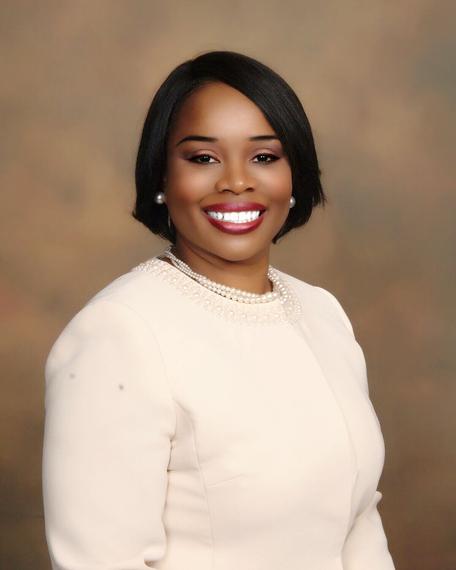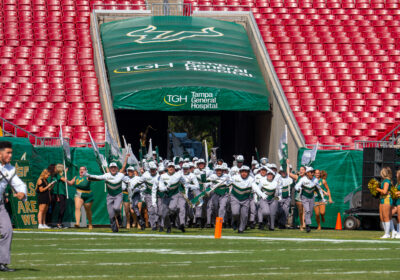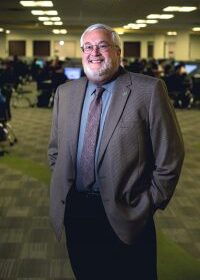Empowerment through representation: Ruthmae Sears advocates for greater diversity in STEM

This story is part of a continuing series that features women leaders at USF during Women’s History Month.
Perfect exam scores as well as chess and bible reading competitions came easy to Ruthmae Sears when she was young, contributing to her future in academia.
Sears grew up in Nassau, Bahamas, where her family were heavily involved in the church community. This group was where she met a host of mentors that would aid her in beginning her accelerated academic track.
Reflecting upon her achievements within mathematics research and academics allows her to better appreciate the “village” that uplifted her during her upbringing, according to Sears. As the first Black USF faculty member to be inducted as an American Association for the Advancement of Science fellow, she said the support she received from her community during her childhood remains fundamental to her success.
“As I look back, I realize that they taught me to really attend to precision in the language [of mathematics],” Sears said. “I am blessed because I had a support system that reached out, checked in and followed up on me.”
Her parents thought she had the ability to conceptualize strategy games and placed her in competitive chess and bridge programs to further stimulate her development. She also competed in her first bible reading competition at 3 years old.
Sears received her undergraduate education degree at the College of the Bahamas, where she was able to expand on her interests in mathematical theories while studying their intersection with teaching.
Under the Teacher Cadet Program, Sears came to the U.S. in 2004 to pursue her master’s degree in mathematics education at Indiana University. She stayed to complete her doctoral degree within the specialty at the University of Missouri-Columbia.
As an associate professor of secondary mathematics at USF, Sears’ research is primarily focused on facilitating student development in education, particularly within the realms of clinical experience and integration of technology in mathematics.
She expected that those within the field would be able to bond over their collective passion for mathematics regardless of differences in identity. However, Sears said that entering higher-level mathematics research as a Black woman didn’t come without struggle.
“I have to come to own my reality … I came in very innocent to this space, but I had to realize that you’re dealing with people, and people have different norms, cultures, perspectives and even beliefs,” Sears said.
“The first thing that people may see is my visible identity: a Black female. They are seeing this construct as to how race [and] gender are defined … and I was not raised to have those parameters.”
Combatting unfairness toward women in education requires establishing a sense of belonging both within and outside of the classroom, according to Sears.
“We talk about access, achievement, identity and power as dimensions to equity, but what we need to think about is what are [people] having access to,” Sears said.
“At the end of the day, we’re all in this together, but are we just the person who is stepping on others? Are we able to be a support to help others move forward as well? To me, equity is at the core of what we do.”
Being the lead faculty facilitator for the university’s Inclusive and Equitable pedagogy program and associate director of the Coalition for Science Literacy have assisted Sears in becoming a distinguished figure within social justice research at USF.
Kelley Schuler, a fellow colleague of Sears on the Coalition for Science Literary, said Sears’ contributions to the workplace are greatly appreciated by those around her.
“Dr. Sears has a smile that will brighten your day … her energy and enthusiasm will boost you when needed and her scholarship and willingness to share her insights are engaging,” Schuler said.
“She is notably appreciative of her colleagues’ contributions … [Although] she has been in the spotlight a lot lately, she seeks to share it with others and never forgets those who have supported her on her journey.”
Outside of the classroom, Sears has assisted with conducting various projects to help marginalized groups in the past, such as building a school for pregnant teenage mothers and advocating for victims of racial discrimination during her time as the president of the Association of Black Graduate Students.
Associate Director of the Coalition for Science Literacy Robert Potter said Sears’ passion for mathematics education is evident in her contributions toward empowering others.
“Dr. Sears brings a wealth of knowledge about effective teaching and learning to the work environment,” Potter said.
“I appreciate and admire her knowledge and experience, but her positive attitude, passion and willingness to do the hard work is special. She always does what she commits to.”
Young women aspiring to enter STEM education are often deterred by a lack of representation, according to Sears. For those that experience such concerns, especially women of color, Sears believes the primary goal should be to persevere in the face of adversity.
“I would tell them don’t give up, keep pushing and aim high in pursuing your goals,” Sears said.
“We celebrate the Katherine Johnsons and the Dorothy Vaughans, but one day it is going to be your name on a building. Your aim is going to be remembered and [sung] to history as someone that changed the game.”







